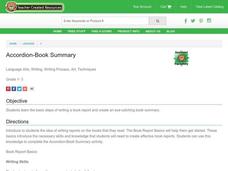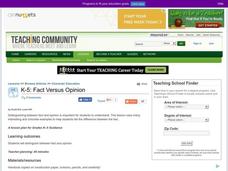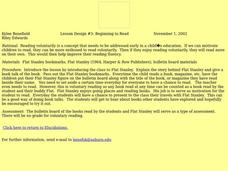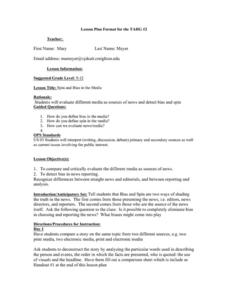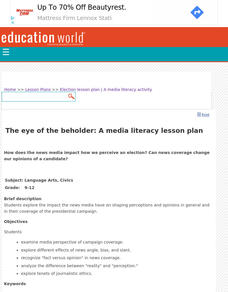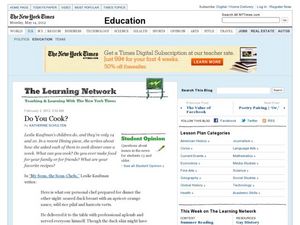Curated OER
Breaking News English: Apple Suing Samsung
Why is Apple suing Samsung? Give your English language learners a bit of reading comprehension practice. First, they read the short passage provided, and then they complete 10 activities. There are true or false questions, matching...
Curated OER
Fact V. Opinion
Students use statements out of newpapers to distinguish between facts and opinions. They discuss these differences as well.
Curated OER
Accordion-Book Summary
Introduce your young readers to the book review. Groups of writers practice the basic steps of writing a book report and complete an Accordion-Book Summary activity. The lesson includes book report basics and directions to make...
Curated OER
Fact Versus Opinion
Students differentiate between fact and opinion. They define fact and opinion, then listen to and identify examples of each. Students identify different books where facts and opinions can be found, and cut out newspaper and magazine...
Curated OER
The Star-Spangled Banner
Get your kids moving as they learn about the history of the United States National Anthem. Scholars examine the War of 1812, Francis Scott Key, and the meaning behind The Star Spangled Banner as they listen to an 18-minute...
Curated OER
My Opinion Template
Fourth and fifth graders identify opinions and supporting details with this graphic organizer. Consider giving your class different categories to create opinions around. There is space to identify four different opinions.
Curated OER
Differences in Opinion
Learners get together in small groups to create a set of rules, such as how to respectfully express one's opinion, and how to respect other people's opinions, even if they differ from you own. Everyone role-plays, and attempts to use the...
Curated OER
Fact Versus Opinion
Young learners distinguish statements as fact or fiction. After exploring a newspaper, they determine the type of information it contains. They read editorial articles and discuss the differences between the editorial page and the front...
Curated OER
That Is Not My Opinion!
Being an informed citizen requires distinguishing fact from opinion and understanding persuasion methods. Secondary learners evaluate newspaper editorials. They read opinion pieces, identify the writer's purpose and position on an issue,...
Curated OER
Supporting Opinions: Handling the End of a Friendship
Four thought-provoking questions encourage readers to develop and support their opinions about strategies to end a friendship after exploring excerpts from a New York Times article. The reading is brief so this could be a lead-in to...
Curated OER
Beginning to Read
Students explore various books read by their classmates outside of school. After reading books of their choice, the class creates a bulletin board summarizing their main ideas of the book and their opinion of the book using Flat Stanley.
Curated OER
Student Opinion: How Should Schools Address Bullying?
Spark a disscussion about a current issue, bullying, in your classroom. This resource, published by The New York Times, provides a short article discussing a Anti-Bullying Bill of Rights passed into law in the state New Jersey followed...
Curated OER
Prince Ibrahima
Sixth graders read and utilize the facts from the story "Abd al-Rahmen Ibrahima" by Walter Dean Myers to analyze the main character's life which is ruined by conflict, jealousy, and greed. Journal entries are created in response to the...
Curated OER
Fact or Opinion
Have your class differentiate between fact and opinion using this presentation. Learners read a series of statements and identify whether the example is fact or opinion. This is a terrific and motivating way to explore this topic.
Curated OER
Author's Opinion
Students complete a worksheet. For this author's opinion lesson, students learn how to determine an author's opinion when it is not explicitly stated in the text. Students answer fact and opinion questions and use them to...
Curated OER
Distinguish Fact from Opinion in Passage
Is it a fact or is it an opinion; readers need to know. Second graders learn a new technique to determine if a sentence or reading passage is fact based or opinion based. They read and then ask evidence based questions to determine if...
Curated OER
Success and Fame
Learners explore success and fame. For this success lesson students discuss famous quotations about success. Learners give their own definitions of success.
Curated OER
Conventions: Strong Verbs
Fifth graders practice using strong verbs. In this conventions lesson plan, 5th graders brainstorm words to complete sentences and list lively and exciting verbs. Students act out meanings of certain words. Students come up with new ways...
Curated OER
Spin and Bias in the Media
Students compare different types of media. For this media comparison lesson, students will assess the where all types of media gets its information by viewing a video of a news story and critiquing it.
Curated OER
CHRISTMAS FILM REVIEW
High schoolers write reviews of films they have seen over the Christmas holidays. They study what the ingredients of a film review are, and examine the difference between fact and opinion.
Curated OER
The Eye of the Beholder: A Media Literacy Activity
Students explore the impact the news media have on shaping perceptions and opinions in general and in their coverage of the presidential campaign.
Curated OER
Children Cooking at Home: Developing Opinions
Excerpts from a New York Times article about children cooking dinner for their family can lead learners to express opinions about taking on real life responsibilities. The story will prompt discussion, but add more questions directed at...
Pennsylvania Department of Education
Analyzing Key Ideas and Details in Nonfiction
Students explore nonfiction texts. In this language arts lesson, students read a nonfiction text and make predictions. Students identify facts and opinions in the text and draw conclusions as they read.
Curated OER
Fact and Opinion
Sixth graders discuss the terms "explicit opinions," and "implicit opinions," from a text. For this literacy lesson, 6th graders analyze the author's techniques to find explicitly stated opinions. Additionally, students complete a...




